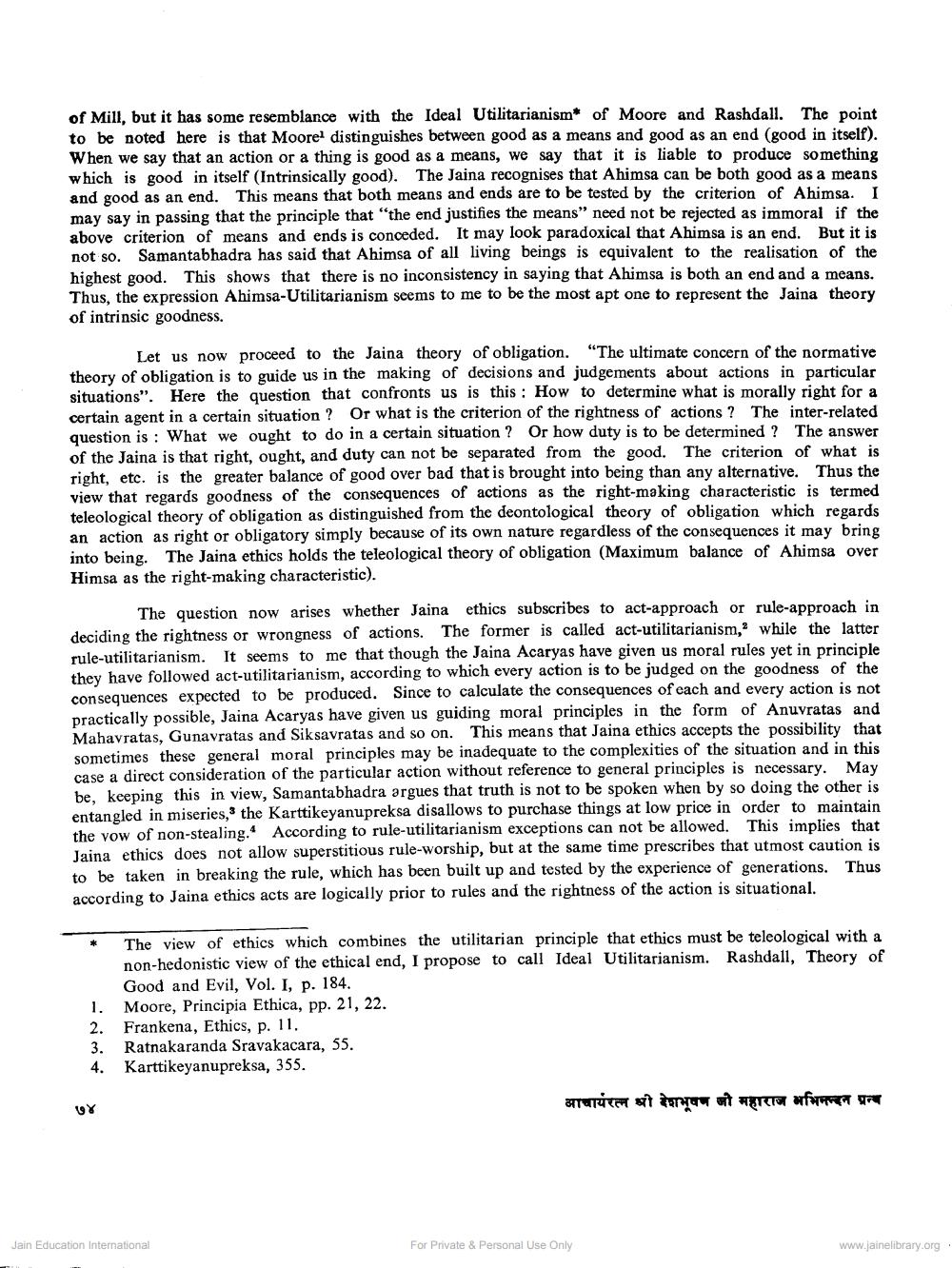Book Title: Jaina Ethical Theory Author(s): Kamalchand Sogani Publisher: Z_Deshbhushanji_Maharaj_Abhinandan_Granth_012045.pdf View full book textPage 2
________________ of Mill, but it has some resemblance with the Ideal Utilitarianism* of Moore and Rashdall. The point to be noted here is that Moorel distinguishes between good as a means and good as an end (good in itself). When we say that an action or a thing is good as a means, we say that it is liable to produce something which is good in itself (Intrinsically good). The Jaina recognises that Ahimsa can be both good as a means and good as an end. This means that both means and ends are to be tested by the criterion of Ahimsa. I may say in passing that the principle that the end justifies the means" need not be rejected as immoral if the above criterion of means and ends is conceded. It may look paradoxical that Ahimsa is an end. But it is not so. Samantabhadra has said that Ahimsa of all living beings is equivalent to the realisation of the highest good. This shows that there is no inconsistency in saying that Ahimsa is both an end and a means. Thus, the expression Ahimsa-Utilitarianism seems to me to be the most apt one to represent the Jaina theory of intrinsic goodness. Let us now proceed to the Jaina theory of obligation. "The ultimate concern of the normative theory of obligation is to guide us in the making of decisions and judgements about actions in particular situations". Here the question that confronts us is this: How to determine what is morally right for a certain agent in a certain situation? Or what is the criterion of the rightness of actions ? The inter-related question is: What we ought to do in a certain situation? Or how duty is to be determined ? The answer of the Jaina is that right, ought, and duty can not be separated from the good. The criterion of what is right, etc. is the greater balance of good over bad that is brought into being than any alternative. Thus the view that regards goodness of the consequences of actions as the right-making characteristic is termed teleological theory of obligation as distinguished from the deontological theory of obligation which regards an action as right or obligatory simply because of its own nature regardless of the consequences it may bring into being. The Jaina ethics holds the teleological theory of obligation (Maximum balance of Ahimsa over Himsa as the right-making characteristic). The question now arises whether Jaina ethics subscribes to act-approach or rule-approach in deciding the rightness or wrongness of actions. The former is called act-utilitarianism, while the latter rule-utilitarianism. It seems to me that though the Jaina Acaryas have given us moral rules yet in principle they have followed act-utilitarianism, according to which every action is to be judged on the goodness of the consequences expected to be produced. Since to calculate the consequences of each and every action is not practically possible, Jaina Acaryas have given us guiding moral principles in the form of Anuvratas and Mahavratas, Gunavratas and Siksavratas and so on. This means that Jaina ethics accepts the possibility that sometimes these general moral principles may be inadequate to the complexities of the situation and in this case a direct consideration of the particular action without reference to general principles is necessary. May be. keeping this in view, Samantabhadra argues that truth is not to be spoken when by so doing the other is entangled in miseries, the Karttikeyanupreksa disallows to purchase things at low price in order to maintain the vow of non-stealing. According to rule-utilitarianism exceptions can not be allowed. This implies that Jaina ethics does not allow superstitious rule-worship, but at the same time prescribes that utmost caution is to be taken in breaking the rule, which has been built up and tested by the experience of generations. Thus according to Jaina ethics acts are logically prior to rules and the rightness of the action is situational. The view of ethics which combines the utilitarian principle that ethics must be teleological with a non-hedonistic view of the ethical end, I propose to call Ideal Utilitarianism. Rashdall, Theory of Good and Evil, Vol. I, p. 184. Moore, Principia Ethica, pp. 21, 22. 2. Frankena, Ethics, p. 11. 3. Ratnakaranda Sravakacara, 55. 4. Karttikeyanupreksa, 355. आचार्यरत्न श्री देशभवन जी महाराज अभिनन्दन प्रन्च Jain Education International For Private & Personal Use Only www.jainelibrary.orgPage Navigation
1 2 3 4 5 6 7 8 9 10 11 12
